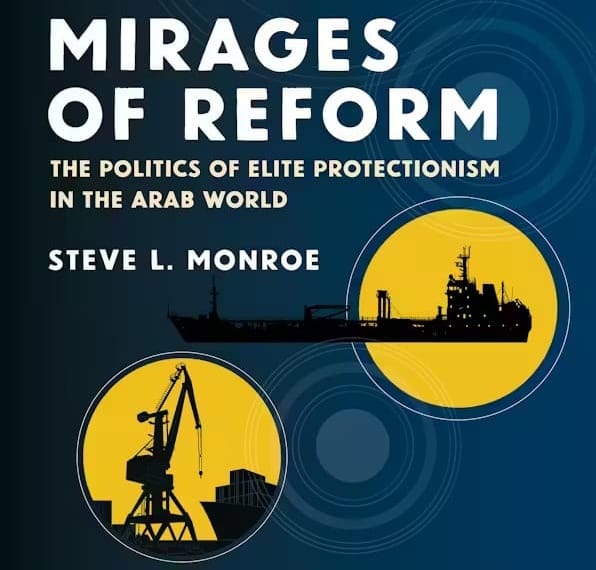What Does Trump Want in the Middle East?

This week's trip to the Gulf has everyone guessing. My new article previews the issues and the stakes.
Most of the optics around Donald Trump's upcoming visit to the Gulf this week has been around his search for investment and deals, and the almost unbelievably brazen corruption on display – billions of dollars of UAE investment in Trump's cryptocurrency scam, Qatar's plan to gift Trump a half billion dollar luxury jet, and so on. But there are real issues in play – and it's playing out very differently from his first trip as president back in 2017. I try to unpack the issues in a new article for Foreign Affairs out this morning (link and preview below).
A bit of context. The 2017 trip, in addition to the sword dancing and the glowing orb of doom, was meant to lay the foundations for "Maximum Pressure" sanctions on Iran. Gulf leaders and Israel welcomed the departure of Barack Obama and his preference for diplomacy with Iran (and, in Israel's case, even his impotent gestures towards the importance of peace with the Palestinians). In the bellicose first term Trump and his cabinet of Iran hawks, they saw a chance to confront and push back against Iran and to reset the US-led regional order back into its traditional pattern of Israeli-Gulf-American cooperation against Iran and its allies.
It didn't quite happen that way. Instead, the UAE and Saudi Arabia got what they considered a green light to launch a comprehensive blockade of Qatar. Their blockade prioritized regional proxy wars and competitive interventions of the previous half decade in arenas such as Syria, Libya, Yemen, Tunisia and Egypt over a unified front against Iran or anything to do with Israel and the Palestinians. That blockade paralyzed the Gulf Cooperation Council, accelerated violent conflicts across the region, and ultimately strengthened Iran and its proxies. I think the decision to visit Qatar and the UAE along with Saudi Arabia on this trip is not only an expansion of opportunities for Trump's personal enrichment (though it is certainly that) - it's likely a signal that there should be no replay of that fiasco.
Nor did the Gulf leaders get the full-throated security backing and confrontational approach to Iran that they had expected. In 2019, Gulf leaders were shocked when Trump opted to not retaliate against an attack on Saudi Arabia's Abqaiq oil refineries – an attack on oil, not even people but oil! Not even Trump's subsequent assassination of Qassem Soleimani restored their confidence that the US would actually come to their defense if Iran attacked.
The mood in the Gulf today is quite different. While Israel continues to push the United States to take the war to Tehran, the Gulf has emerged as a surprising antiwar caucus – not out of any love for the Islamic Republic of Iran, obviously, but for fear of a costly and destructive war in which they would be the prime targets. The focus surrounding this visit is the direction of the US-Iran nuclear negotiations being mediated by Oman. That doesn't mean that war with Iran has been ruled out. Indeed, if the talks fail, which remains unfortunately likely given the Trump adminstration's dysfunction and Iran's understandable skepticism after Trump unilaterally ripped up the last deal they made, it could pave a fast track to war. Gulf leaders, as I argue in the piece, are perplexed by Trump's mixed messaging and erratic policies – but also see real opportunities to take advantage of his aversion to war with Iran and his bottomless thirst for personal enrichment.
It wouldn't be an exaggeration to say that Israel and pro-Israeli voices are freaking out about the trip. Over the last few weeks they've watched Trump fire the national security advisor who had been reportedly preparing plans with Netanyahu for an attack on Iran; abruptly end the bombing campaign against the Houthis without securing any commitment to end attacks against Israel; directly negotiate with Hamas to get a US citizen hostage released. They see billions of Gulf dollars being funneled to Trump – and are especially shocked by the reported gift of a luxury jet from Qatar, which is enemy number one for many Israelis because of its alleged support for Hamas (and, very much in the news, a spectacular scandal linking Qatar to Netanyahu). Rumors are flying that Trump will recognize a Palestinian state, or call for an end to the war in Gaza, or do something else to please his Gulf hosts. Few Arab sources seem as certain that he will bend over backward to meet Arab and Palestinian concerns - it seems equally possible that he envisions offering Israel a full free hand to do as it will with Gaza and even the West Bank as compensation for the nuclear deal with Iran.
We will see soon enough. It's difficult to be too optimistic about anything to do with Trump, as he rampages his way through American democracy, trashes the economy, cripples state capacity, shuts down humanitarian aid, attacks higher education based on utterly cynical and manufactured concern about 'antisemitism', and tosses aside core alliances abroad. But on the Middle East (as on the Gaza protests), as I argue in Foreign Affairs and in my forthcoming book America's Middle East, he hasn't been that much different from Biden so far – mostly more bloodthirsty versions of the same policies.
That could change quickly: either through the world historical irony of restoring the nuclear agreement with Iran that Biden didn't, or through bungled diplomacy paving the path to war. He could force Israel to back off from its promised obliteration of Gaza and impose the ceasefire which Biden refused, at such horrific human cost, or he could oversee the endgame of ethnic cleansing and genocide. It's easy to see MBS deciding to normalize relations with Israel despite its destruction of Gaza as a honeymoon present for Trump – and a calculated final insult to the despised Joe Biden. It's also easy to see Saudi Arabia seeing few benefits and many risks to signing on to such a deal on the eve of a potential bloodbath in Gaza, especially with a president whose promises carry little credibility - what value is there to a security treaty with a president who seems willing to walk away from even NATO?
It's remarkable that nobody really knows which way he even intends it to go – much less if he can pull it off. I try to preview all of this today. Please read the full article over at Foreign Affairs, where I flesh out the historical context, the continuities between Trump and Biden, and some of the key issues beyond Iran up for discussion – from Israel and Gaza to Syria, Yemen, oil prices, and competing visions of regional order.
What Does Trump Want in the Middle East? America's Allies Wish They Knew
This week, U.S. President Donald Trump is set to visit three key American partners in the Middle East: Qatar, Saudi Arabia, and the United Arab Emirates (UAE). It is not yet clear what he hopes to achieve. He may be seeking to secure arms deals and investments in the United States. He might hope to personally enrich himself through Gulf investments in Trump properties, investment funds, and cryptocurrencies. But many hope—and others worry—that he has larger ambitions. In particular, it seems possible that his trip is mostly about Iran, a country with which his administration has been conducting negotiations relating to its nuclear program. Because of the erratic nature of Trump’s administration and internal disagreement among his key advisers, however, his trip could just as easily set the stage for war with Iran as it could for signing a nuclear agreement.
Leaders in the Arab states of the Gulf had hoped for Trump’s reelection. They had done well during Trump’s first term and had little love for U.S. President Joe Biden. (The same was true of most ordinary people in their countries, who blamed Biden for enabling Israel’s destruction of Gaza.) Saudi Crown Prince Mohammed bin Salman, also known as MBS, would never forgive Biden for calling Saudi Arabia a “pariah” because of its assassination of the journalist Jamal Khashoggi. MBS maintained close relationships with Trump and his associates during the Biden years, and he strung Biden along with the prospect that Saudi Arabia might normalize relations with Israel, which, before October 7, 2023, was the single overriding goal of an administration that was otherwise disengaged from the Middle East.
But 100 days into the second Trump administration, those leaders are perplexed and concerned.....



